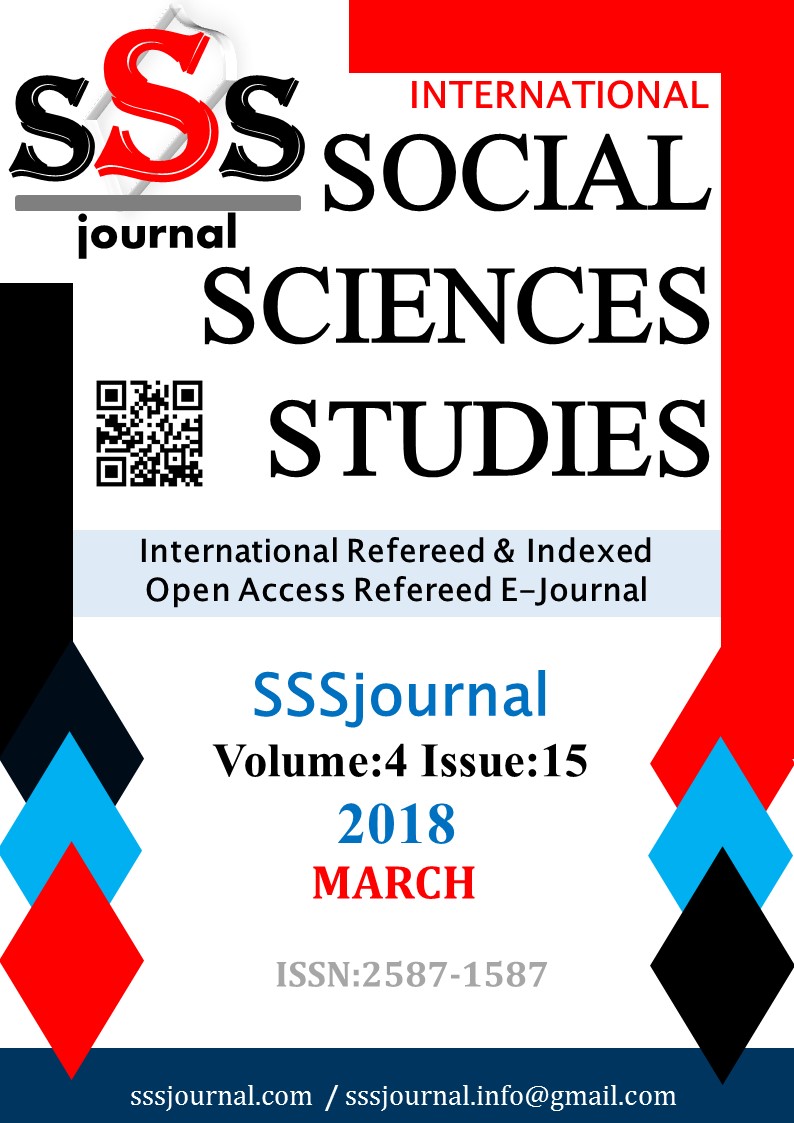ÜNİVERSİTE ÖĞRENCİLERİNİN AFFETME DAVRANIŞLARI, YAŞAM DOYUMLARI VE SÜREKLİ ÖFKE DÜZEYLERİ ARASINDAKİ İLİŞKİLERİN İNCELENMESİ
Author :
Abstract
Bu çalışma, üniversite öğrencilerinin affetme davranışları, yaşam doyumları ve sürekli öfke düzeyleri arasındaki ilişkileri incelemek amacıyla yapılmıştır. Araştırma grubu Ankara ilinde Gazi Üniversitesi Gazi Eğitim Fakültesi’nde on iki farklı bölümde öğrenim gören toplam 638 öğrenciden oluşmaktadır. Araştırmada veriler; “Heartland Affetme Ölçeği”, “Yaşam Doyumu Ölçeği” ve “Sürekli Öfke-Öfke İfade Biçimleri Ölçeği”nin (SÖÖBÇ) “Sürekli Öfke” alt ölçeği ve “Kişisel Bilgi Formu” uygulanarak elde edilmiştir. Elde edilen veriler SPSS programı kullanılarak çözümlenmiştir. Verilerin analizinde bağımsız gruplar t-testi, tek yönlü varyans analizi (ANOVA), Pearson Momentler Çarpımı Korelasyonu ve Çoklu Regresyon Analizi kullanılmıştır. Araştırmada; başkasını affetme ve yaşam doyumunda kadın öğrencilerin puanları, erkek öğrencilere göre anlamlı düzeyde yüksektir. Erkek öğrencilerin ise sürekli öfke puanları kadın öğrencilerden daha yüksektir. BÖTE öğrencilerinin durumu affetme puanları Resim Öğretmenliği öğrencilerinden daha yüksektir. Ayrıca PDR öğrencilerinin genel affetme puanları İlköğretim Matematik ve Sosyal Bilgiler Öğretmenliği öğrencilerinden daha yüksektir. Öğrencilerin affetme davranışları ile yaşları ve devam edilen sınıf düzeyleri arasında anlamlı bir ilişki bulunamamıştır. Affetmenin bütün alt boyutlarının yaşam doyumu ile pozitif yönlü anlamlı ilişkiler gösterdiği bulunmuş ancak yaşam doyumu ile en fazla durumu affetme boyutu pozitif yönlü ilişkili bulunmuştur. Affetmenin bütün alt boyutlarının sürekli öfke ile negatif yönlü anlamlı ilişkiler gösterdiği ancak sürekli öfke ile en az kendini affetme boyutu negatif yönlü ilişkili bulunmuştur. Affetmenin bütün alt boyutlarının birbirleri ile pozitif yönlü anlamlı ilişkiler gösterdiği bulunmuştur. Yaşam doyumu ile sürekli öfke arasında negatif yönlü ve orta düzeyde ilişki görüldüğü bulunmuştur. Elde edilen bulgular, yapılan araştırmalarla birlikte tartışılmış ve önerilerde bulunulmuştur.
Keywords
Abstract
The aim of this research is to investigate the relationship between forgiveness behaviour, life satisfaction and trait- anger of the university students. The research group consisted of 638 students from twelve different departments from Gazi University Faculty of Education in Ankara. “Heartland Forgiveness Scale (HFS)”, “Satisfaction with Life Scale (SwLS)”, “Continuous Anger” subscale of “Continuous Anger and Anger Expression Style Scale” and “Personal Info Form” were applied in data acquisition of this research. The SPSS (Statistical Package for Social Sciences) was used for the analysis of the collected data. To analyse the data; independent samples t-test, one-way analysis of variance (ANOVA), Pearson product-moment correlation coefficient and multiple regression analysis were used. In the light of this research, the scores of forgiveness and life satisfaction of female students are significantly higher than male students. Trait-anger scores of male students, on the other hand, are higher than female students. The scores of forgiveness of the situation are higher among Computer Education and Instructional Technology students than Art Teaching students. Also, the scores of general forgiveness of Psychological Counselling and Guidance students are higher than Elementary Mathematics Teacher Education and Social Sciences Teaching students. No meaningful relationship between the forgiveness behaviour and age and on-going education level was found, all sub-dimensions of forgiveness and life satisfaction are positively related into each other, however; forgiveness of the case is the furthest positively related one with life satisfaction. All sub-dimensions of forgiveness are negatively related to trait-anger, yet least negatively related one is the self-forgiveness. In the light of the research, it was found that all sub-dimensions of forgiveness are positively related into each other. A negative and a medium- level relationship between life satisfaction and trait- anger was found. The acquired findings were discussed with conducted researches and some suggestions were made.
Keywords
- Akhtar ,S. (2002). Forgiveness: Origins, Dynamics, Psychopathology, And Technical Relevance, The
- Akhtar ,S. (2002). Forgiveness: Origins, Dynamics, Psychopathology, And Technical Relevance, The Psychoanalitic Quarterly,Volume L XXI, Issue2,April ,Pages 175-212
- Diener, E. D., Emmons, R. A., Larsen, R. J. & Griffin, S. (1985). The satisfaction with life scale. Journal of personality assessment, 49(1), 71-75.
- Enright, R.D.,& Gassin, E.A. (1992). Forgiveness: A developmental view. Journal of Moral Education, 21, 99-114.
- Enright, R.D. & The Human Development Study Group (1996). Counseling with in the forgiveness triad: On forgiving, receiving forgiveness, and self-forgiveness. Counseling and Values, 40(2), 107-126.
- Fisher,M.L.ve Exline,J. (2007) .Self-forgiveness versus excusing: The roles of remorse, effort, and acceptance of responsibility, Self and Identity, 5:2, 127-146, DOI: 10.1080/15298860600586123
- Gable, S. ve Haidt, J.(2005). Review of General Psychology.What (and Why) Is Positive Psychology? DO - 10.1037/1089-2680.9.2.103
- Gençtan, E. (2004). İnsan olmak. İstanbul: Varlık.
- Orathinkal, J;Vansteenwegen ,A. ve Burggraeve,R. (2008).Are Demographics Important for Forgiveness? Show all authorsThe Family Journal. Vol 16, Issue 1
- Özer, M. ve Karabulut, Ö.Ö. (2003). Yaşlılarda yaşam doyumu, Geriatri Dergisi, 6(2), 72.
- Sastre, M., Vinsonneau, G., Neto, F., Girard, M., & Mullet, E. (2003). Forgivingness and satisfaction with life. Journal of Happiness Studies, 4, 323–335.
- Soylu, B. (2010). Psikolojik ve sosyal dışlanma ile sosyal reddedilme kavramları arasındaki farklılıklarınsaldırganlık temelinde incelenmesi: Cinsiyet, bağışlayıcı kişilik ve negatif duygulanımın rolü. Yüksek Lisans Tezi, Hacettepe Üniversitesi Sosyal Bilimler Enstitüsü, Ankara.
- Şahin, M. (2013). Affedicilik ile psikolojik iyi olma arasındaki ilişkinin çeşitli değişkenler açısından incelenmesi.Yüksek Lisans Tezi, Sakarya Üniversitesi Eğitim Bilimleri Enstitüsü, Sakarya
- Taysi, E. (2007). İkili ilişkilerde bağışlama: İlişki kalitesi ve yüklemelerin rolü. Doktora tezi, Ankara Üniversitesi Sosyal Bilimler Enstitüsü,Ankara
- Thompson, L. Y., Snyder, C. R., Hoffman, L., Michael, S. T., Rasmussen, H. N., Billings, L. S., et al. (2005). Dispositional forgiveness of self, others, and situations. Journal of Personality, 73, 313–359.
- Toussaint, L. L., Williams, D. R., Musick, M. A., & Everson, S. A. (2001). Forgiveness and health: Age differences in a U.S. Probability sample. Journal of Adult Development, 8, 249–257.
- Toussaint, L. & Webb, J.R. (2005). Gender differences in the relationship between empathy and forgiveness. The Journal of Social Psychology, 145(6), 673-685.
- Toussaint, L. L., & Webb, J. R. (2005). Theoretical and empirical connections between forgiveness, mentalhealth, and well-being. In E. L. Worthington (Ed.), Handbook of forgiveness. New York: Brunner- Routledge.
- Witvliet,C.V.O.; Phipps,K.A.; Feldman,M.E. ve Beckham,J.C. (2004). Posttraumatic mental and physicalhealth correlates of forgiveness and religious coping in military veterans. Journal of Traumatic Stress. Volume 17, Issue 3,June Pages 269-273. https://doi.org/10.1023/B:JOTS.0000029270.47848.e5





